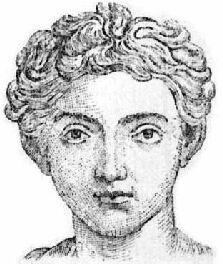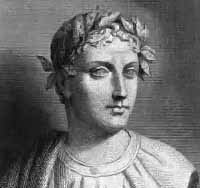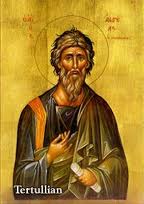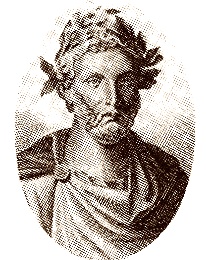This was a period of civil wars and dictators, of
military might against constitutional right, of selfish interest, of
brilliant pomp and power, of moral and religious laxity.

Tituts Lucretius Carus (ca. 96 -55 B.C.): De Rerum
Natura - a powerful didactic poem on happiness achieved through the
Epicurean philosophy.
Not much is know about the life of this philosopher
poet. His only work, De rerum natura ("About the essence of
things"), was published posthumously by Cicero. He was not a popular
writer; Quintilianus complained that he was difficult to understand,
and St. Jerome claimed he wrote his work "between his insanities."
Today however, dating back to the Renaissance, he held in high regard.

Caius Valerius Catullus (ca 84-54 B.C.): lyric poet.
The first great Roman poet, born in Verona. As a
youth, Catullus came to Rome where he met and fell head-over-heels in
love with a woman named Clodia (in his poems called Lesbia). Many of
his poems depicts their stormy relationship and its vicissitudes. He
also wrote short poems and elegies, but the Lesbia poems are perhaps
his most famous.

Marcus Tullius Cicero (106-43 B.C.): the greatest Roman
orator
Roman orator, writer and politician, consul in 63
BC. During his consulate, Cicero exposed an attempted coup d'etat led
by Catalina and had the conspirators (except Catalina himself)
executed. Charged with having carried out the execution without a legal
sentence, he was exiled in 58 BC. He was recalled only a year later,
but turned his back on politics and applied himself to literary work
instead. After Caesar's murder, Cicero returned to politics and, hoping
to restore the Republic, held a series of speeches in the Senate that
fiercely attacked Marc Anthony. This proved to be fatal: during the
proscriptions of the Second Triumvirate, Marc Anthony had Cicero
murdered.
A lot of Cicero's extensive writing has been
preserved, such as speeches, philosophic documents and personal
letters, and his writing is regarded as having been normative for the
Latin language.

Gaiius Julius Caesar (102-44 B.C.): orator, politician,
dictator, author. De Bello Gallico
Roman general and statesman. A brilliant general,
Caesar conquered all of Gaul and was made governor of Gallia Cisalpina
and Gallia Transalpina, and started a
civil war against the Senate and his former colleague Pompeius
when they wanted him to relinquish command and give up his
governorship. After defeating Pompey and gaining control over Rome,
Caesar was elected dictator (a title not to be confused with our
present-day use of the term; a Roman dictator ruled with absolute power
for a brief period of time during a severe crisis), first yearly -
which was almost unheard of - and later for ten years. His obvious
striving for autocracy provoked and scared the old Senate nobility, and
his being elected dictator for life in 44 BC was the final straw: about
sixty senators conspired and stabbed him to death on March 15, Idibus
Martiis.
Caesar's two great works are Commentarii de
bello Gallico ("Commentaries on the Gallic War") and Commentarii
de bello civili ("Commentaries on the Civil War"), both skillfully
written propaganda for Caesar himself and his cause. Just as Cicero's,
Caesar's prose is regarded as having been normative for the Latin
language. ( Which probably causes both of them to turn in their graves,
since they didn't exactly love each other - Cicero didn't exactly
grieve when Caesar was murdered.)
(Titbits of information for the interested: Caesar
probably didn't say "et tu, Brute" (and he almost certainly didn't say
"ista vis est", "but this is violence"), but something like "Miarotate
Kaska, ti poieis?", "Casca, you bloody scoundrel, what are you doing?",
as Plutarch suggests. Only one of the more than 60 stabs he received
was fatal: the second one. Of course, there is no way of knowing who
dealt it.)
Cornelius Nepos (99-24 B.C.): writer of biographies.
Publilius Syrus (ca. 45 B.C.): a slave who became famous
for his mimes.

Publius Vergilius Maro (70-19 B.C.): poet laureate. Aeneid
- a national epic with ample universal and human appeal.
Roman poet, born near Mantua. Despite his simple
heritage - he was the son of a farmer - Vergil was given the
opportunity to study, among other things, rhetoric, history and
philosophy, and his poems soon got the attention of Maecenas and
Augustus. His first great work was Bucolica (also called Eclogae),
a collection of pastorals, the second the didactic poem Georgica.
But his magnum opus was the Roman national epic Aeneid, written
under the last ten or twelve years of his life and never finished, that
in twelve songs tells about how the Trojan hero Aeneas came to Latium
and on the gods' command founded the Roman empire and its imperial
dynasty. Vergil asked his friend Varius to burn the work after the
poet's death, but Augustus ordered it published, thus preserving it to
posterity.

Quintus Horatius Flaccus (65-8 B.C.): poet laureate.
Titus Livius (59 B.C. - 17 A.D.):
Roman historian, born in Padova in northern Italy.
Livy began writing his Roman history Ab urbe condita in 26 BC
and hadn't yet finished it when he died in 17 AD. Books 1 - 10 and 21 -
45 are all that are left of his great work of 142 books - of the rest,
only fragments have been preserved.

Piblius Ovidius Naso (43 B.C. - 17 A.D.): metamorphoses.
Roman poet. In 9 AD, Ovid was exiled by Augustus to
Tomi (where he died) for "carmen et error" (a poem and an
error). The poem was probably Ars amandi ("The Art of Love"),
but what the error was, we can only guess. Much of Ovid's work has been
lost, but among the preserved is Ars amandi, Remedi amoris,
Epistulae ex Ponto and his most famous work, Metamorphoses.

![[Owl]](../images/fish.jpg) Latin Authors
Latin Authors













